Exploring Sustainability in Tourism Destinations: A Research Proposal
VerifiedAdded on 2023/03/30
|21
|5678
|66
Report
AI Summary
This research proposal explores the critical issue of sustainability in tourism destinations, addressing the gap in existing literature regarding environmental protection and sustainable tourism practices. It emphasizes the need to understand the role of tourists in preserving natural resources and examines the negative impacts of unsustainable tourism. The study employs a mixed-method approach, combining qualitative face-to-face interviews with quantitative survey data collection to comprehensively assess the challenges and opportunities in developing sustainable tourism. The research questions focus on the advantages and disadvantages of sustainable tourism and the ways in which sustainability promotes tourism globally, aiming to provide insights into balancing economic benefits with environmental and socio-cultural preservation.
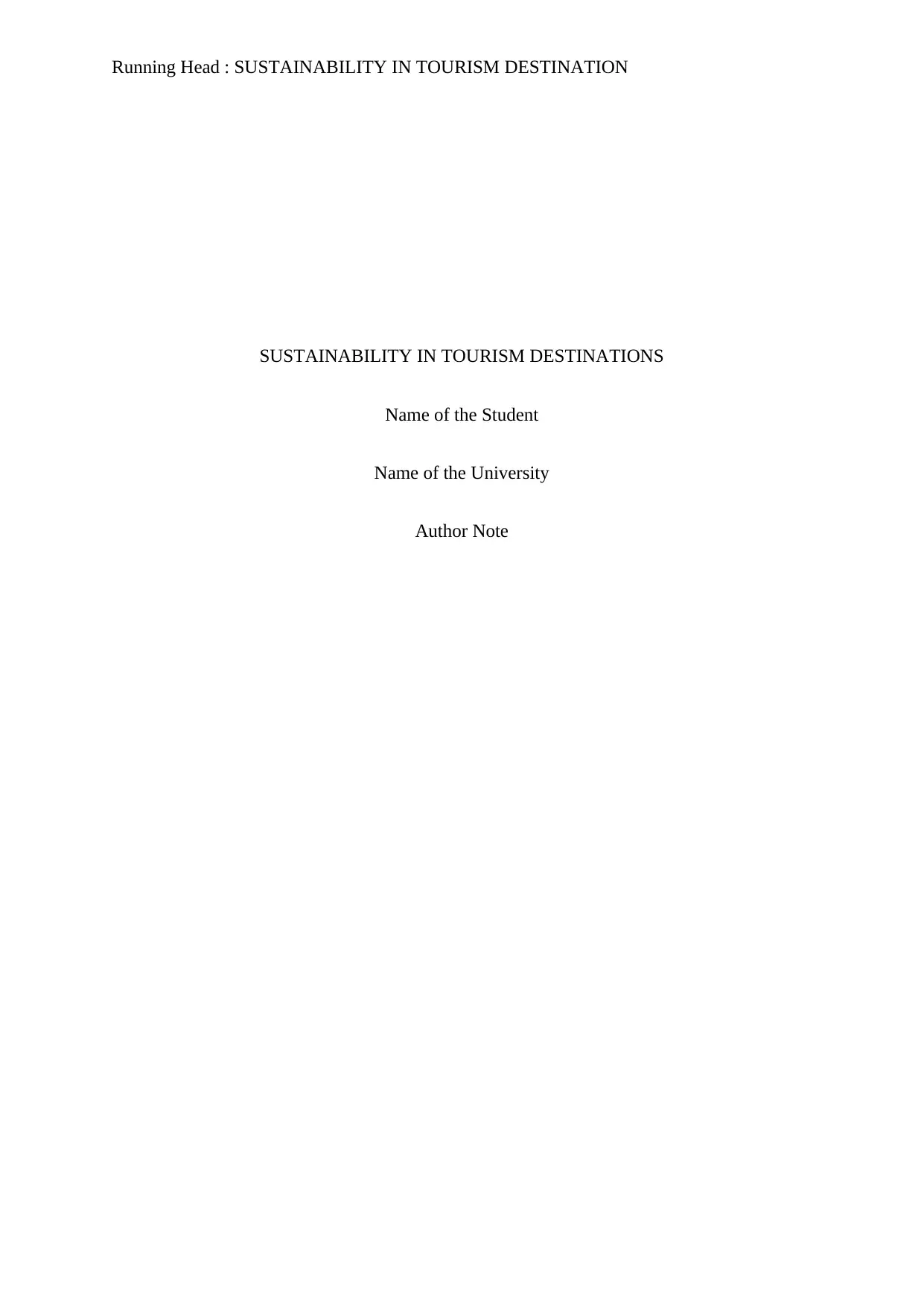
Running Head : SUSTAINABILITY IN TOURISM DESTINATION
SUSTAINABILITY IN TOURISM DESTINATIONS
Name of the Student
Name of the University
Author Note
SUSTAINABILITY IN TOURISM DESTINATIONS
Name of the Student
Name of the University
Author Note
Paraphrase This Document
Need a fresh take? Get an instant paraphrase of this document with our AI Paraphraser
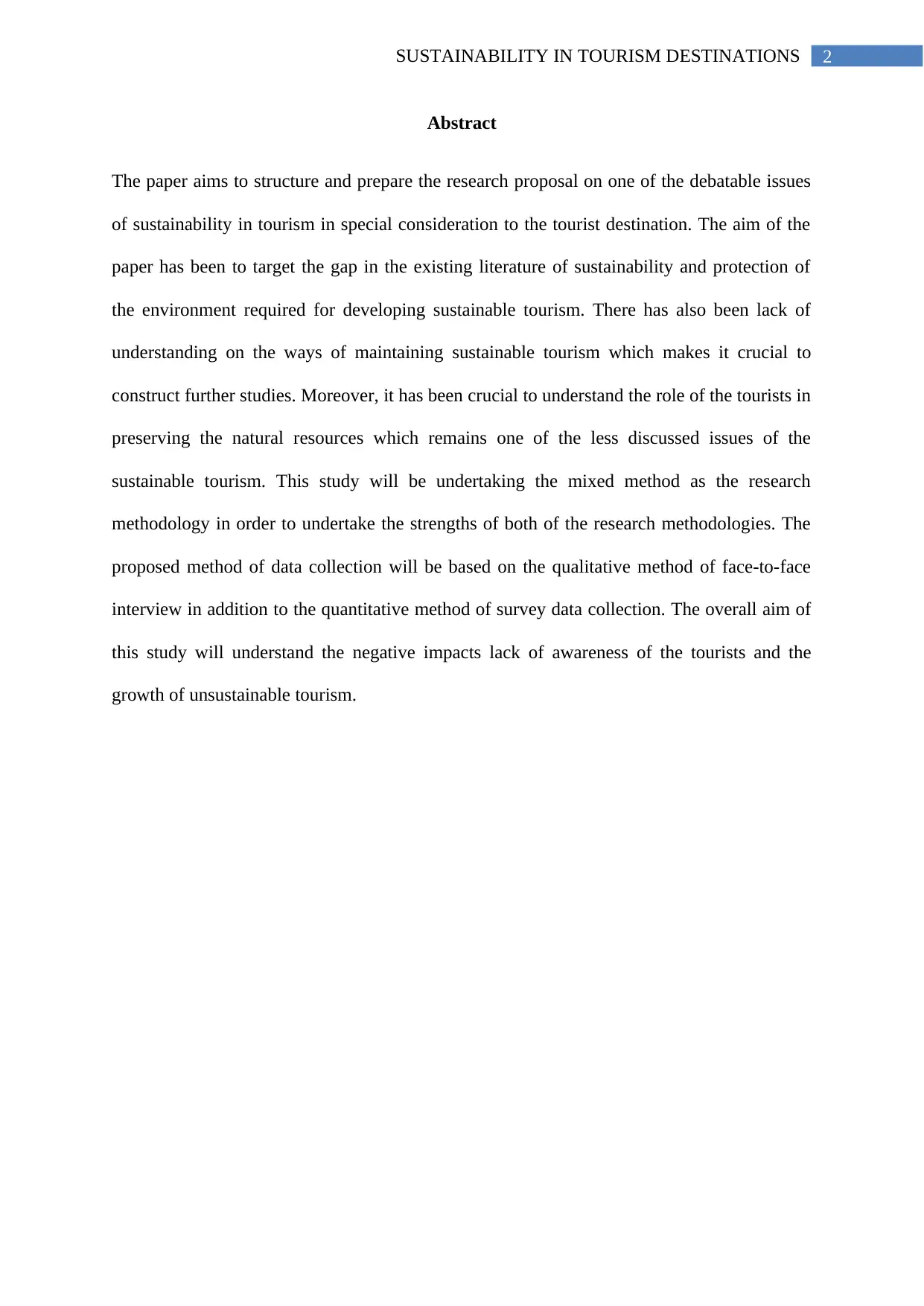
2SUSTAINABILITY IN TOURISM DESTINATIONS
Abstract
The paper aims to structure and prepare the research proposal on one of the debatable issues
of sustainability in tourism in special consideration to the tourist destination. The aim of the
paper has been to target the gap in the existing literature of sustainability and protection of
the environment required for developing sustainable tourism. There has also been lack of
understanding on the ways of maintaining sustainable tourism which makes it crucial to
construct further studies. Moreover, it has been crucial to understand the role of the tourists in
preserving the natural resources which remains one of the less discussed issues of the
sustainable tourism. This study will be undertaking the mixed method as the research
methodology in order to undertake the strengths of both of the research methodologies. The
proposed method of data collection will be based on the qualitative method of face-to-face
interview in addition to the quantitative method of survey data collection. The overall aim of
this study will understand the negative impacts lack of awareness of the tourists and the
growth of unsustainable tourism.
Abstract
The paper aims to structure and prepare the research proposal on one of the debatable issues
of sustainability in tourism in special consideration to the tourist destination. The aim of the
paper has been to target the gap in the existing literature of sustainability and protection of
the environment required for developing sustainable tourism. There has also been lack of
understanding on the ways of maintaining sustainable tourism which makes it crucial to
construct further studies. Moreover, it has been crucial to understand the role of the tourists in
preserving the natural resources which remains one of the less discussed issues of the
sustainable tourism. This study will be undertaking the mixed method as the research
methodology in order to undertake the strengths of both of the research methodologies. The
proposed method of data collection will be based on the qualitative method of face-to-face
interview in addition to the quantitative method of survey data collection. The overall aim of
this study will understand the negative impacts lack of awareness of the tourists and the
growth of unsustainable tourism.
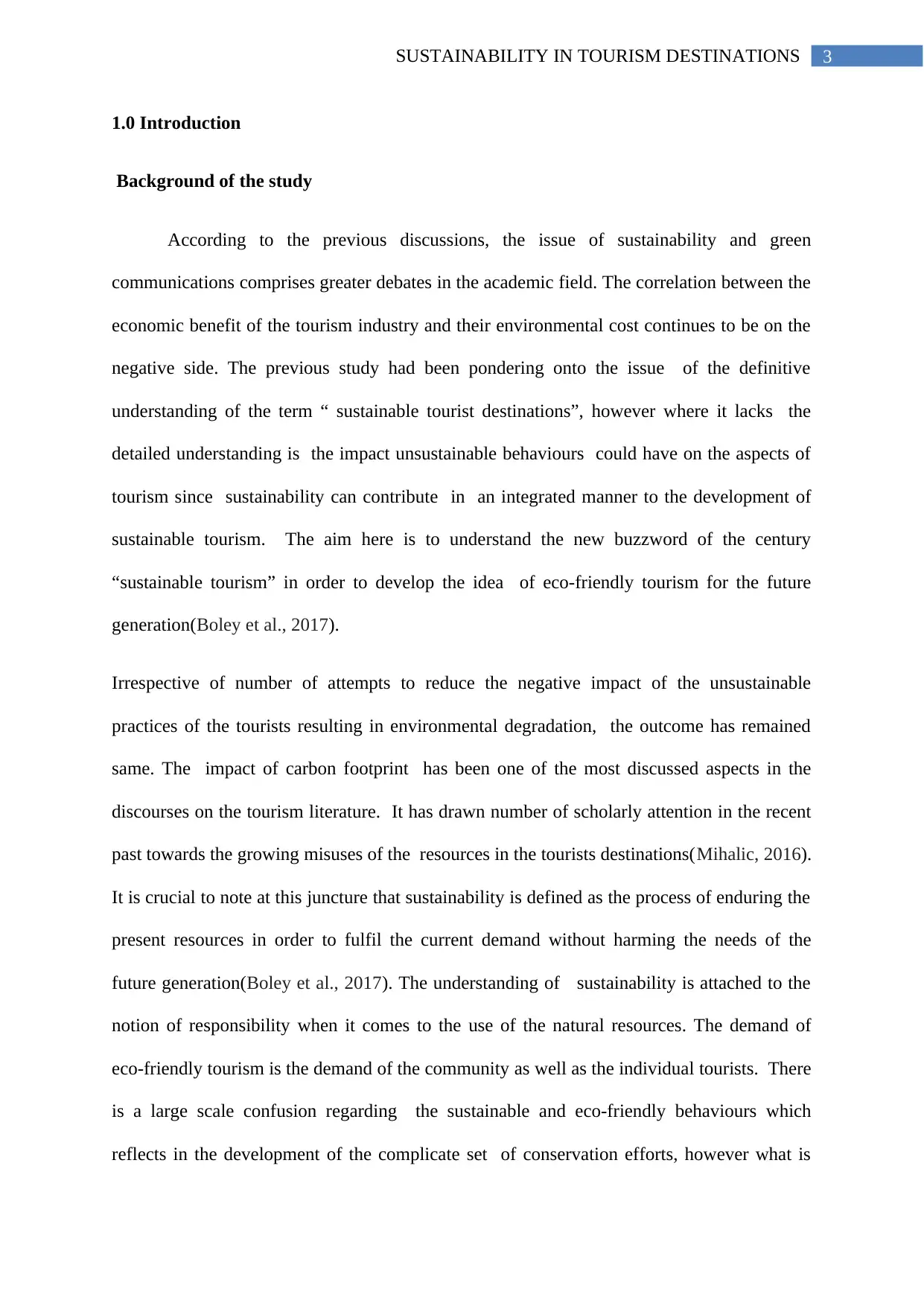
3SUSTAINABILITY IN TOURISM DESTINATIONS
1.0 Introduction
Background of the study
According to the previous discussions, the issue of sustainability and green
communications comprises greater debates in the academic field. The correlation between the
economic benefit of the tourism industry and their environmental cost continues to be on the
negative side. The previous study had been pondering onto the issue of the definitive
understanding of the term “ sustainable tourist destinations”, however where it lacks the
detailed understanding is the impact unsustainable behaviours could have on the aspects of
tourism since sustainability can contribute in an integrated manner to the development of
sustainable tourism. The aim here is to understand the new buzzword of the century
“sustainable tourism” in order to develop the idea of eco-friendly tourism for the future
generation(Boley et al., 2017).
Irrespective of number of attempts to reduce the negative impact of the unsustainable
practices of the tourists resulting in environmental degradation, the outcome has remained
same. The impact of carbon footprint has been one of the most discussed aspects in the
discourses on the tourism literature. It has drawn number of scholarly attention in the recent
past towards the growing misuses of the resources in the tourists destinations(Mihalic, 2016).
It is crucial to note at this juncture that sustainability is defined as the process of enduring the
present resources in order to fulfil the current demand without harming the needs of the
future generation(Boley et al., 2017). The understanding of sustainability is attached to the
notion of responsibility when it comes to the use of the natural resources. The demand of
eco-friendly tourism is the demand of the community as well as the individual tourists. There
is a large scale confusion regarding the sustainable and eco-friendly behaviours which
reflects in the development of the complicate set of conservation efforts, however what is
1.0 Introduction
Background of the study
According to the previous discussions, the issue of sustainability and green
communications comprises greater debates in the academic field. The correlation between the
economic benefit of the tourism industry and their environmental cost continues to be on the
negative side. The previous study had been pondering onto the issue of the definitive
understanding of the term “ sustainable tourist destinations”, however where it lacks the
detailed understanding is the impact unsustainable behaviours could have on the aspects of
tourism since sustainability can contribute in an integrated manner to the development of
sustainable tourism. The aim here is to understand the new buzzword of the century
“sustainable tourism” in order to develop the idea of eco-friendly tourism for the future
generation(Boley et al., 2017).
Irrespective of number of attempts to reduce the negative impact of the unsustainable
practices of the tourists resulting in environmental degradation, the outcome has remained
same. The impact of carbon footprint has been one of the most discussed aspects in the
discourses on the tourism literature. It has drawn number of scholarly attention in the recent
past towards the growing misuses of the resources in the tourists destinations(Mihalic, 2016).
It is crucial to note at this juncture that sustainability is defined as the process of enduring the
present resources in order to fulfil the current demand without harming the needs of the
future generation(Boley et al., 2017). The understanding of sustainability is attached to the
notion of responsibility when it comes to the use of the natural resources. The demand of
eco-friendly tourism is the demand of the community as well as the individual tourists. There
is a large scale confusion regarding the sustainable and eco-friendly behaviours which
reflects in the development of the complicate set of conservation efforts, however what is
⊘ This is a preview!⊘
Do you want full access?
Subscribe today to unlock all pages.

Trusted by 1+ million students worldwide
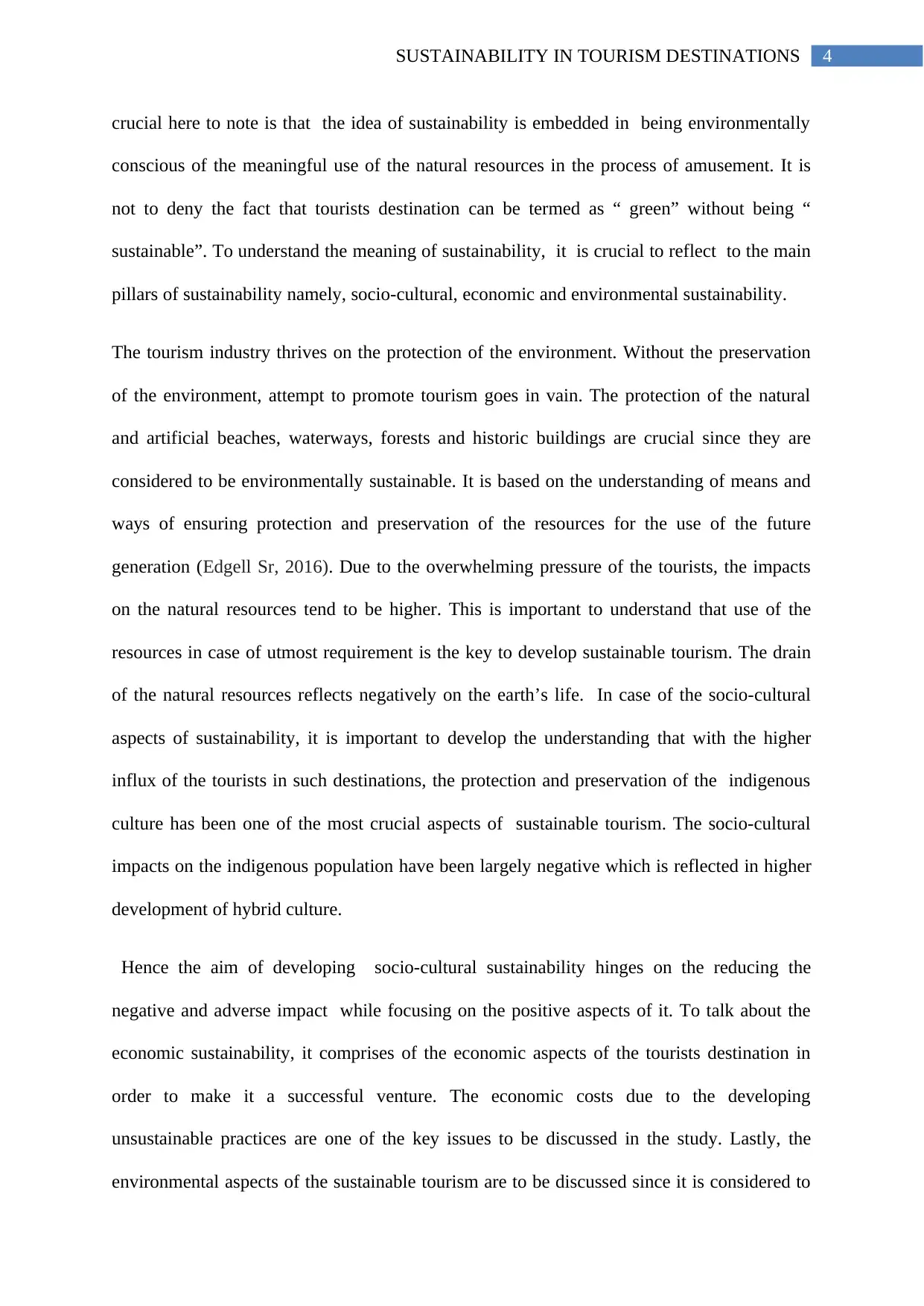
4SUSTAINABILITY IN TOURISM DESTINATIONS
crucial here to note is that the idea of sustainability is embedded in being environmentally
conscious of the meaningful use of the natural resources in the process of amusement. It is
not to deny the fact that tourists destination can be termed as “ green” without being “
sustainable”. To understand the meaning of sustainability, it is crucial to reflect to the main
pillars of sustainability namely, socio-cultural, economic and environmental sustainability.
The tourism industry thrives on the protection of the environment. Without the preservation
of the environment, attempt to promote tourism goes in vain. The protection of the natural
and artificial beaches, waterways, forests and historic buildings are crucial since they are
considered to be environmentally sustainable. It is based on the understanding of means and
ways of ensuring protection and preservation of the resources for the use of the future
generation (Edgell Sr, 2016). Due to the overwhelming pressure of the tourists, the impacts
on the natural resources tend to be higher. This is important to understand that use of the
resources in case of utmost requirement is the key to develop sustainable tourism. The drain
of the natural resources reflects negatively on the earth’s life. In case of the socio-cultural
aspects of sustainability, it is important to develop the understanding that with the higher
influx of the tourists in such destinations, the protection and preservation of the indigenous
culture has been one of the most crucial aspects of sustainable tourism. The socio-cultural
impacts on the indigenous population have been largely negative which is reflected in higher
development of hybrid culture.
Hence the aim of developing socio-cultural sustainability hinges on the reducing the
negative and adverse impact while focusing on the positive aspects of it. To talk about the
economic sustainability, it comprises of the economic aspects of the tourists destination in
order to make it a successful venture. The economic costs due to the developing
unsustainable practices are one of the key issues to be discussed in the study. Lastly, the
environmental aspects of the sustainable tourism are to be discussed since it is considered to
crucial here to note is that the idea of sustainability is embedded in being environmentally
conscious of the meaningful use of the natural resources in the process of amusement. It is
not to deny the fact that tourists destination can be termed as “ green” without being “
sustainable”. To understand the meaning of sustainability, it is crucial to reflect to the main
pillars of sustainability namely, socio-cultural, economic and environmental sustainability.
The tourism industry thrives on the protection of the environment. Without the preservation
of the environment, attempt to promote tourism goes in vain. The protection of the natural
and artificial beaches, waterways, forests and historic buildings are crucial since they are
considered to be environmentally sustainable. It is based on the understanding of means and
ways of ensuring protection and preservation of the resources for the use of the future
generation (Edgell Sr, 2016). Due to the overwhelming pressure of the tourists, the impacts
on the natural resources tend to be higher. This is important to understand that use of the
resources in case of utmost requirement is the key to develop sustainable tourism. The drain
of the natural resources reflects negatively on the earth’s life. In case of the socio-cultural
aspects of sustainability, it is important to develop the understanding that with the higher
influx of the tourists in such destinations, the protection and preservation of the indigenous
culture has been one of the most crucial aspects of sustainable tourism. The socio-cultural
impacts on the indigenous population have been largely negative which is reflected in higher
development of hybrid culture.
Hence the aim of developing socio-cultural sustainability hinges on the reducing the
negative and adverse impact while focusing on the positive aspects of it. To talk about the
economic sustainability, it comprises of the economic aspects of the tourists destination in
order to make it a successful venture. The economic costs due to the developing
unsustainable practices are one of the key issues to be discussed in the study. Lastly, the
environmental aspects of the sustainable tourism are to be discussed since it is considered to
Paraphrase This Document
Need a fresh take? Get an instant paraphrase of this document with our AI Paraphraser
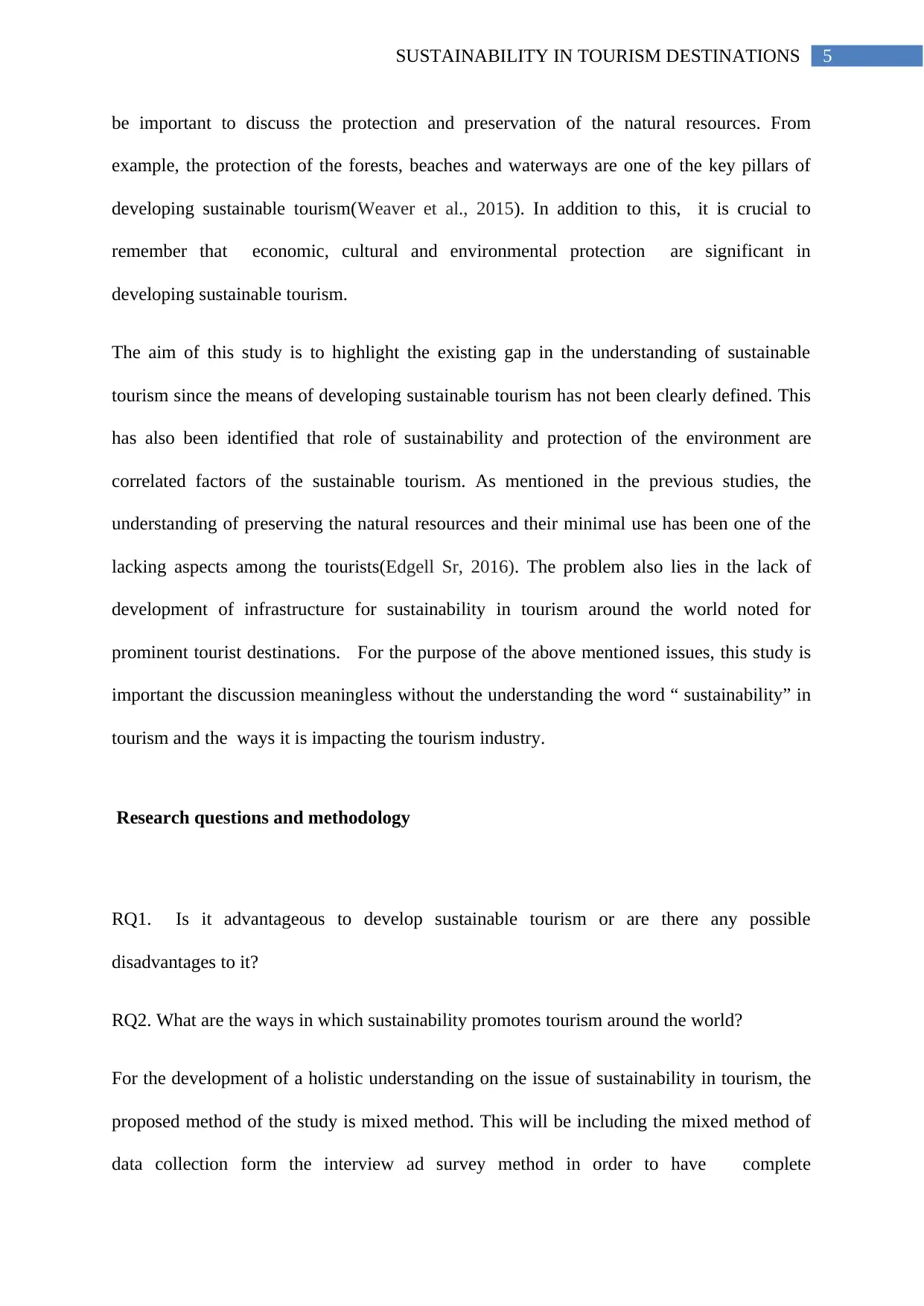
5SUSTAINABILITY IN TOURISM DESTINATIONS
be important to discuss the protection and preservation of the natural resources. From
example, the protection of the forests, beaches and waterways are one of the key pillars of
developing sustainable tourism(Weaver et al., 2015). In addition to this, it is crucial to
remember that economic, cultural and environmental protection are significant in
developing sustainable tourism.
The aim of this study is to highlight the existing gap in the understanding of sustainable
tourism since the means of developing sustainable tourism has not been clearly defined. This
has also been identified that role of sustainability and protection of the environment are
correlated factors of the sustainable tourism. As mentioned in the previous studies, the
understanding of preserving the natural resources and their minimal use has been one of the
lacking aspects among the tourists(Edgell Sr, 2016). The problem also lies in the lack of
development of infrastructure for sustainability in tourism around the world noted for
prominent tourist destinations. For the purpose of the above mentioned issues, this study is
important the discussion meaningless without the understanding the word “ sustainability” in
tourism and the ways it is impacting the tourism industry.
Research questions and methodology
RQ1. Is it advantageous to develop sustainable tourism or are there any possible
disadvantages to it?
RQ2. What are the ways in which sustainability promotes tourism around the world?
For the development of a holistic understanding on the issue of sustainability in tourism, the
proposed method of the study is mixed method. This will be including the mixed method of
data collection form the interview ad survey method in order to have complete
be important to discuss the protection and preservation of the natural resources. From
example, the protection of the forests, beaches and waterways are one of the key pillars of
developing sustainable tourism(Weaver et al., 2015). In addition to this, it is crucial to
remember that economic, cultural and environmental protection are significant in
developing sustainable tourism.
The aim of this study is to highlight the existing gap in the understanding of sustainable
tourism since the means of developing sustainable tourism has not been clearly defined. This
has also been identified that role of sustainability and protection of the environment are
correlated factors of the sustainable tourism. As mentioned in the previous studies, the
understanding of preserving the natural resources and their minimal use has been one of the
lacking aspects among the tourists(Edgell Sr, 2016). The problem also lies in the lack of
development of infrastructure for sustainability in tourism around the world noted for
prominent tourist destinations. For the purpose of the above mentioned issues, this study is
important the discussion meaningless without the understanding the word “ sustainability” in
tourism and the ways it is impacting the tourism industry.
Research questions and methodology
RQ1. Is it advantageous to develop sustainable tourism or are there any possible
disadvantages to it?
RQ2. What are the ways in which sustainability promotes tourism around the world?
For the development of a holistic understanding on the issue of sustainability in tourism, the
proposed method of the study is mixed method. This will be including the mixed method of
data collection form the interview ad survey method in order to have complete
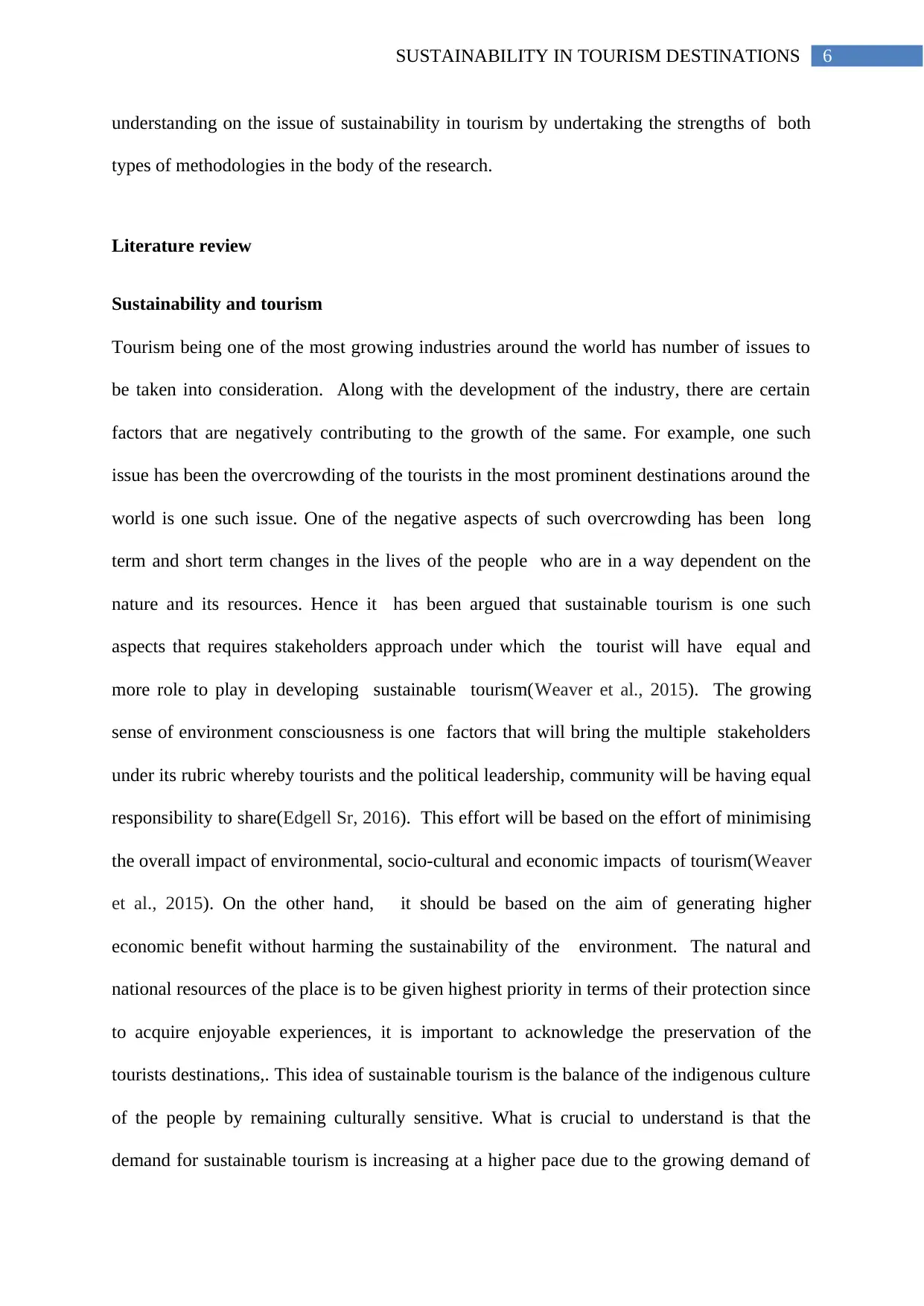
6SUSTAINABILITY IN TOURISM DESTINATIONS
understanding on the issue of sustainability in tourism by undertaking the strengths of both
types of methodologies in the body of the research.
Literature review
Sustainability and tourism
Tourism being one of the most growing industries around the world has number of issues to
be taken into consideration. Along with the development of the industry, there are certain
factors that are negatively contributing to the growth of the same. For example, one such
issue has been the overcrowding of the tourists in the most prominent destinations around the
world is one such issue. One of the negative aspects of such overcrowding has been long
term and short term changes in the lives of the people who are in a way dependent on the
nature and its resources. Hence it has been argued that sustainable tourism is one such
aspects that requires stakeholders approach under which the tourist will have equal and
more role to play in developing sustainable tourism(Weaver et al., 2015). The growing
sense of environment consciousness is one factors that will bring the multiple stakeholders
under its rubric whereby tourists and the political leadership, community will be having equal
responsibility to share(Edgell Sr, 2016). This effort will be based on the effort of minimising
the overall impact of environmental, socio-cultural and economic impacts of tourism(Weaver
et al., 2015). On the other hand, it should be based on the aim of generating higher
economic benefit without harming the sustainability of the environment. The natural and
national resources of the place is to be given highest priority in terms of their protection since
to acquire enjoyable experiences, it is important to acknowledge the preservation of the
tourists destinations,. This idea of sustainable tourism is the balance of the indigenous culture
of the people by remaining culturally sensitive. What is crucial to understand is that the
demand for sustainable tourism is increasing at a higher pace due to the growing demand of
understanding on the issue of sustainability in tourism by undertaking the strengths of both
types of methodologies in the body of the research.
Literature review
Sustainability and tourism
Tourism being one of the most growing industries around the world has number of issues to
be taken into consideration. Along with the development of the industry, there are certain
factors that are negatively contributing to the growth of the same. For example, one such
issue has been the overcrowding of the tourists in the most prominent destinations around the
world is one such issue. One of the negative aspects of such overcrowding has been long
term and short term changes in the lives of the people who are in a way dependent on the
nature and its resources. Hence it has been argued that sustainable tourism is one such
aspects that requires stakeholders approach under which the tourist will have equal and
more role to play in developing sustainable tourism(Weaver et al., 2015). The growing
sense of environment consciousness is one factors that will bring the multiple stakeholders
under its rubric whereby tourists and the political leadership, community will be having equal
responsibility to share(Edgell Sr, 2016). This effort will be based on the effort of minimising
the overall impact of environmental, socio-cultural and economic impacts of tourism(Weaver
et al., 2015). On the other hand, it should be based on the aim of generating higher
economic benefit without harming the sustainability of the environment. The natural and
national resources of the place is to be given highest priority in terms of their protection since
to acquire enjoyable experiences, it is important to acknowledge the preservation of the
tourists destinations,. This idea of sustainable tourism is the balance of the indigenous culture
of the people by remaining culturally sensitive. What is crucial to understand is that the
demand for sustainable tourism is increasing at a higher pace due to the growing demand of
⊘ This is a preview!⊘
Do you want full access?
Subscribe today to unlock all pages.

Trusted by 1+ million students worldwide
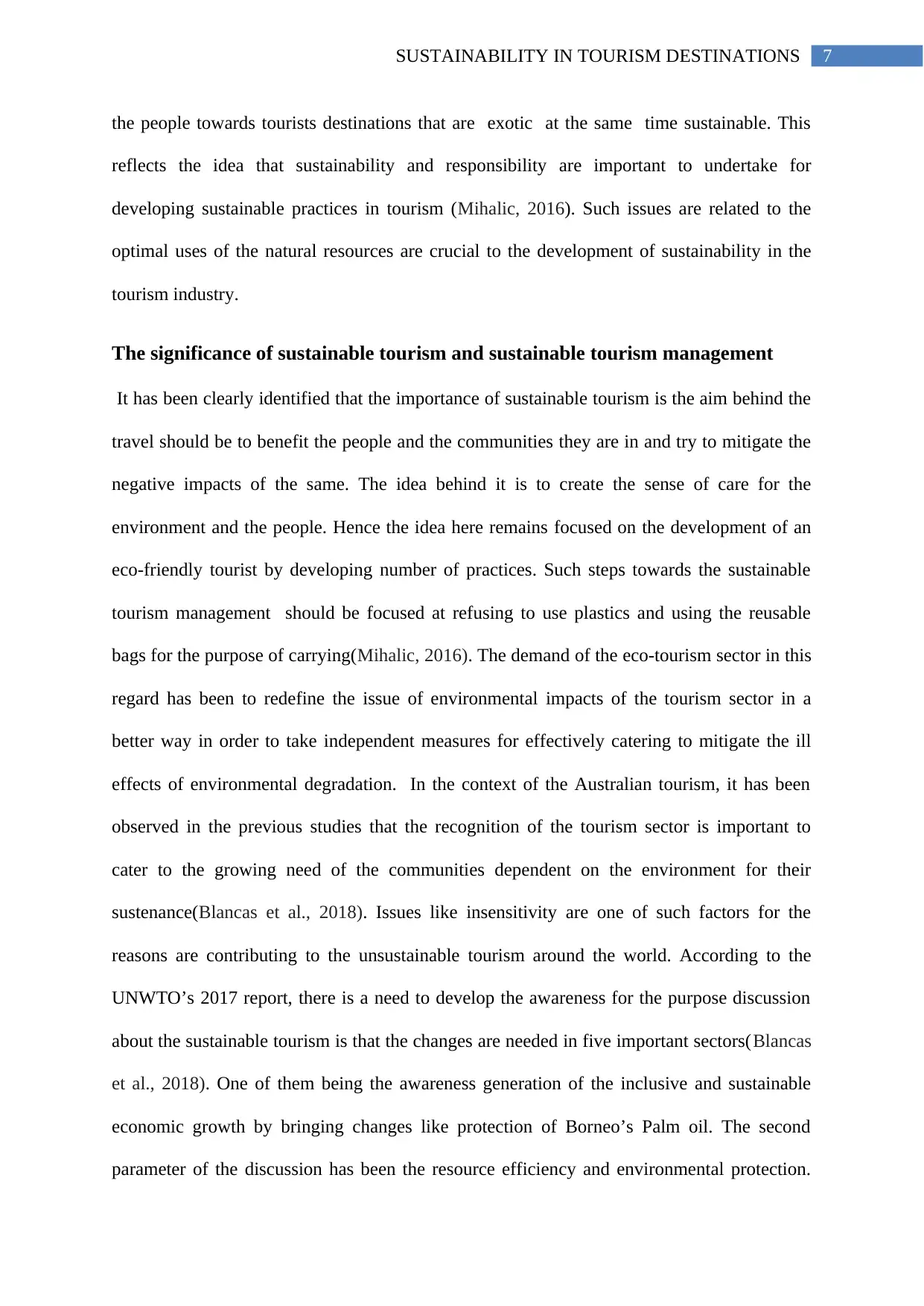
7SUSTAINABILITY IN TOURISM DESTINATIONS
the people towards tourists destinations that are exotic at the same time sustainable. This
reflects the idea that sustainability and responsibility are important to undertake for
developing sustainable practices in tourism (Mihalic, 2016). Such issues are related to the
optimal uses of the natural resources are crucial to the development of sustainability in the
tourism industry.
The significance of sustainable tourism and sustainable tourism management
It has been clearly identified that the importance of sustainable tourism is the aim behind the
travel should be to benefit the people and the communities they are in and try to mitigate the
negative impacts of the same. The idea behind it is to create the sense of care for the
environment and the people. Hence the idea here remains focused on the development of an
eco-friendly tourist by developing number of practices. Such steps towards the sustainable
tourism management should be focused at refusing to use plastics and using the reusable
bags for the purpose of carrying(Mihalic, 2016). The demand of the eco-tourism sector in this
regard has been to redefine the issue of environmental impacts of the tourism sector in a
better way in order to take independent measures for effectively catering to mitigate the ill
effects of environmental degradation. In the context of the Australian tourism, it has been
observed in the previous studies that the recognition of the tourism sector is important to
cater to the growing need of the communities dependent on the environment for their
sustenance(Blancas et al., 2018). Issues like insensitivity are one of such factors for the
reasons are contributing to the unsustainable tourism around the world. According to the
UNWTO’s 2017 report, there is a need to develop the awareness for the purpose discussion
about the sustainable tourism is that the changes are needed in five important sectors(Blancas
et al., 2018). One of them being the awareness generation of the inclusive and sustainable
economic growth by bringing changes like protection of Borneo’s Palm oil. The second
parameter of the discussion has been the resource efficiency and environmental protection.
the people towards tourists destinations that are exotic at the same time sustainable. This
reflects the idea that sustainability and responsibility are important to undertake for
developing sustainable practices in tourism (Mihalic, 2016). Such issues are related to the
optimal uses of the natural resources are crucial to the development of sustainability in the
tourism industry.
The significance of sustainable tourism and sustainable tourism management
It has been clearly identified that the importance of sustainable tourism is the aim behind the
travel should be to benefit the people and the communities they are in and try to mitigate the
negative impacts of the same. The idea behind it is to create the sense of care for the
environment and the people. Hence the idea here remains focused on the development of an
eco-friendly tourist by developing number of practices. Such steps towards the sustainable
tourism management should be focused at refusing to use plastics and using the reusable
bags for the purpose of carrying(Mihalic, 2016). The demand of the eco-tourism sector in this
regard has been to redefine the issue of environmental impacts of the tourism sector in a
better way in order to take independent measures for effectively catering to mitigate the ill
effects of environmental degradation. In the context of the Australian tourism, it has been
observed in the previous studies that the recognition of the tourism sector is important to
cater to the growing need of the communities dependent on the environment for their
sustenance(Blancas et al., 2018). Issues like insensitivity are one of such factors for the
reasons are contributing to the unsustainable tourism around the world. According to the
UNWTO’s 2017 report, there is a need to develop the awareness for the purpose discussion
about the sustainable tourism is that the changes are needed in five important sectors(Blancas
et al., 2018). One of them being the awareness generation of the inclusive and sustainable
economic growth by bringing changes like protection of Borneo’s Palm oil. The second
parameter of the discussion has been the resource efficiency and environmental protection.
Paraphrase This Document
Need a fresh take? Get an instant paraphrase of this document with our AI Paraphraser
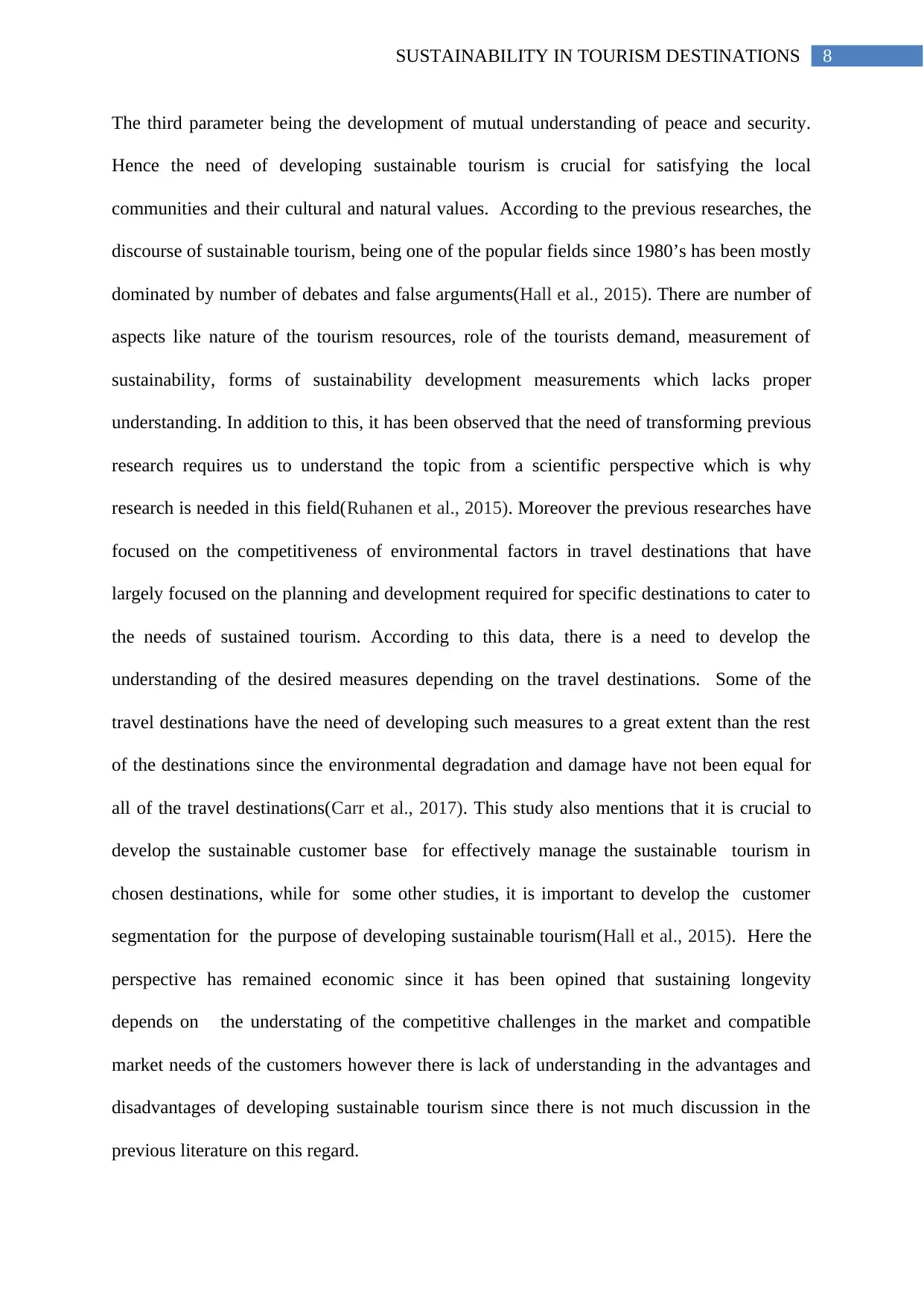
8SUSTAINABILITY IN TOURISM DESTINATIONS
The third parameter being the development of mutual understanding of peace and security.
Hence the need of developing sustainable tourism is crucial for satisfying the local
communities and their cultural and natural values. According to the previous researches, the
discourse of sustainable tourism, being one of the popular fields since 1980’s has been mostly
dominated by number of debates and false arguments(Hall et al., 2015). There are number of
aspects like nature of the tourism resources, role of the tourists demand, measurement of
sustainability, forms of sustainability development measurements which lacks proper
understanding. In addition to this, it has been observed that the need of transforming previous
research requires us to understand the topic from a scientific perspective which is why
research is needed in this field(Ruhanen et al., 2015). Moreover the previous researches have
focused on the competitiveness of environmental factors in travel destinations that have
largely focused on the planning and development required for specific destinations to cater to
the needs of sustained tourism. According to this data, there is a need to develop the
understanding of the desired measures depending on the travel destinations. Some of the
travel destinations have the need of developing such measures to a great extent than the rest
of the destinations since the environmental degradation and damage have not been equal for
all of the travel destinations(Carr et al., 2017). This study also mentions that it is crucial to
develop the sustainable customer base for effectively manage the sustainable tourism in
chosen destinations, while for some other studies, it is important to develop the customer
segmentation for the purpose of developing sustainable tourism(Hall et al., 2015). Here the
perspective has remained economic since it has been opined that sustaining longevity
depends on the understating of the competitive challenges in the market and compatible
market needs of the customers however there is lack of understanding in the advantages and
disadvantages of developing sustainable tourism since there is not much discussion in the
previous literature on this regard.
The third parameter being the development of mutual understanding of peace and security.
Hence the need of developing sustainable tourism is crucial for satisfying the local
communities and their cultural and natural values. According to the previous researches, the
discourse of sustainable tourism, being one of the popular fields since 1980’s has been mostly
dominated by number of debates and false arguments(Hall et al., 2015). There are number of
aspects like nature of the tourism resources, role of the tourists demand, measurement of
sustainability, forms of sustainability development measurements which lacks proper
understanding. In addition to this, it has been observed that the need of transforming previous
research requires us to understand the topic from a scientific perspective which is why
research is needed in this field(Ruhanen et al., 2015). Moreover the previous researches have
focused on the competitiveness of environmental factors in travel destinations that have
largely focused on the planning and development required for specific destinations to cater to
the needs of sustained tourism. According to this data, there is a need to develop the
understanding of the desired measures depending on the travel destinations. Some of the
travel destinations have the need of developing such measures to a great extent than the rest
of the destinations since the environmental degradation and damage have not been equal for
all of the travel destinations(Carr et al., 2017). This study also mentions that it is crucial to
develop the sustainable customer base for effectively manage the sustainable tourism in
chosen destinations, while for some other studies, it is important to develop the customer
segmentation for the purpose of developing sustainable tourism(Hall et al., 2015). Here the
perspective has remained economic since it has been opined that sustaining longevity
depends on the understating of the competitive challenges in the market and compatible
market needs of the customers however there is lack of understanding in the advantages and
disadvantages of developing sustainable tourism since there is not much discussion in the
previous literature on this regard.
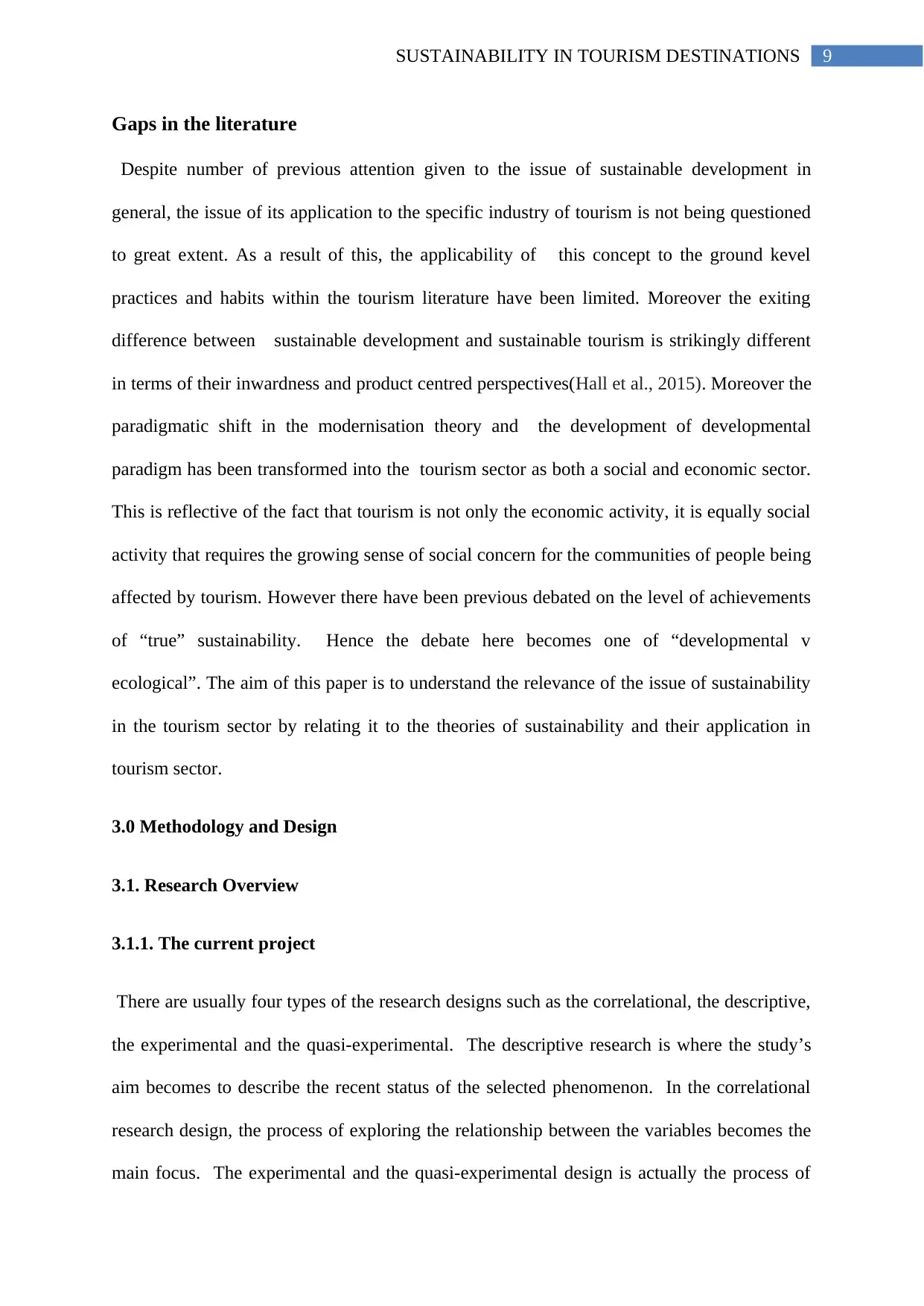
9SUSTAINABILITY IN TOURISM DESTINATIONS
Gaps in the literature
Despite number of previous attention given to the issue of sustainable development in
general, the issue of its application to the specific industry of tourism is not being questioned
to great extent. As a result of this, the applicability of this concept to the ground kevel
practices and habits within the tourism literature have been limited. Moreover the exiting
difference between sustainable development and sustainable tourism is strikingly different
in terms of their inwardness and product centred perspectives(Hall et al., 2015). Moreover the
paradigmatic shift in the modernisation theory and the development of developmental
paradigm has been transformed into the tourism sector as both a social and economic sector.
This is reflective of the fact that tourism is not only the economic activity, it is equally social
activity that requires the growing sense of social concern for the communities of people being
affected by tourism. However there have been previous debated on the level of achievements
of “true” sustainability. Hence the debate here becomes one of “developmental v
ecological”. The aim of this paper is to understand the relevance of the issue of sustainability
in the tourism sector by relating it to the theories of sustainability and their application in
tourism sector.
3.0 Methodology and Design
3.1. Research Overview
3.1.1. The current project
There are usually four types of the research designs such as the correlational, the descriptive,
the experimental and the quasi-experimental. The descriptive research is where the study’s
aim becomes to describe the recent status of the selected phenomenon. In the correlational
research design, the process of exploring the relationship between the variables becomes the
main focus. The experimental and the quasi-experimental design is actually the process of
Gaps in the literature
Despite number of previous attention given to the issue of sustainable development in
general, the issue of its application to the specific industry of tourism is not being questioned
to great extent. As a result of this, the applicability of this concept to the ground kevel
practices and habits within the tourism literature have been limited. Moreover the exiting
difference between sustainable development and sustainable tourism is strikingly different
in terms of their inwardness and product centred perspectives(Hall et al., 2015). Moreover the
paradigmatic shift in the modernisation theory and the development of developmental
paradigm has been transformed into the tourism sector as both a social and economic sector.
This is reflective of the fact that tourism is not only the economic activity, it is equally social
activity that requires the growing sense of social concern for the communities of people being
affected by tourism. However there have been previous debated on the level of achievements
of “true” sustainability. Hence the debate here becomes one of “developmental v
ecological”. The aim of this paper is to understand the relevance of the issue of sustainability
in the tourism sector by relating it to the theories of sustainability and their application in
tourism sector.
3.0 Methodology and Design
3.1. Research Overview
3.1.1. The current project
There are usually four types of the research designs such as the correlational, the descriptive,
the experimental and the quasi-experimental. The descriptive research is where the study’s
aim becomes to describe the recent status of the selected phenomenon. In the correlational
research design, the process of exploring the relationship between the variables becomes the
main focus. The experimental and the quasi-experimental design is actually the process of
⊘ This is a preview!⊘
Do you want full access?
Subscribe today to unlock all pages.

Trusted by 1+ million students worldwide
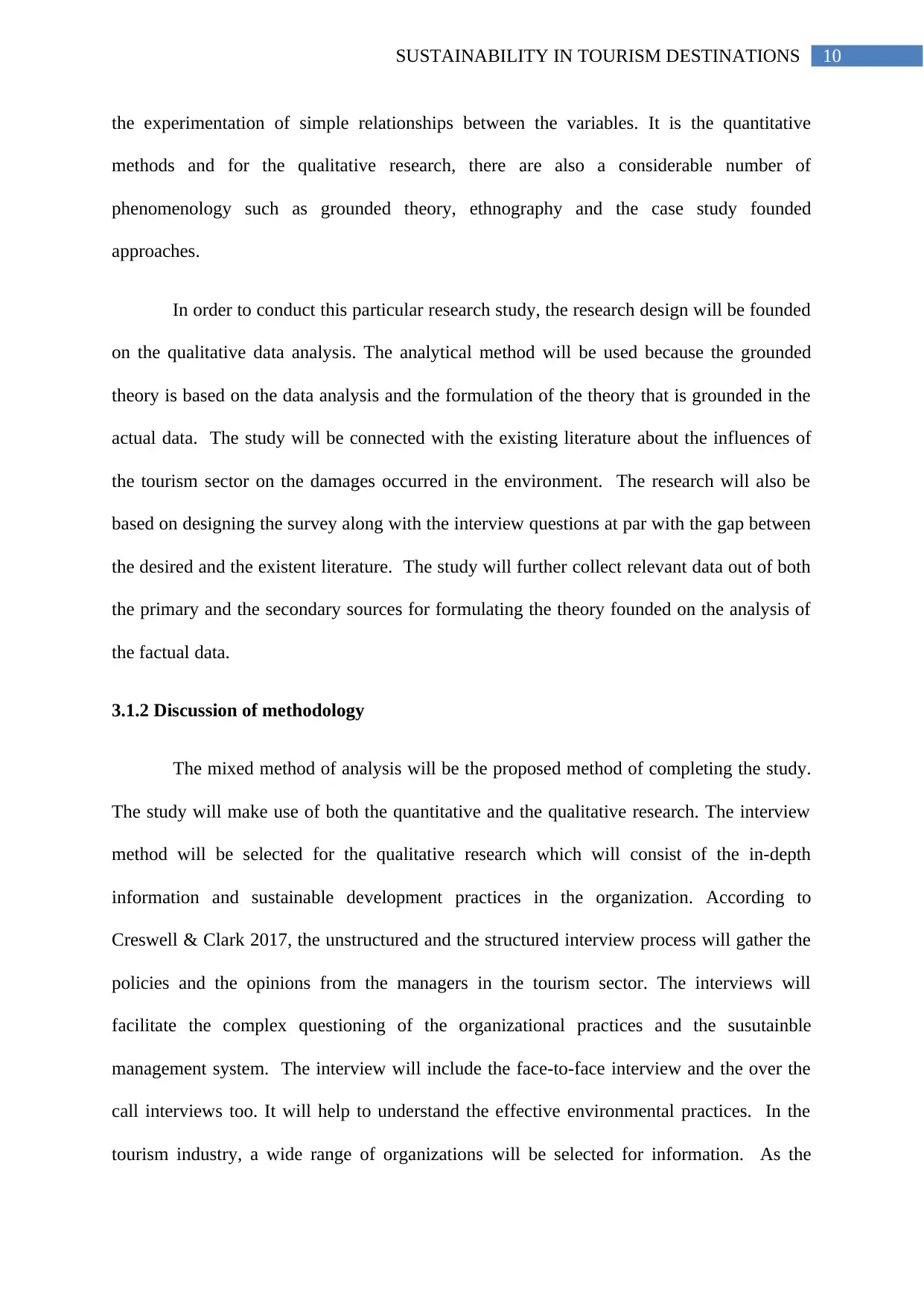
10SUSTAINABILITY IN TOURISM DESTINATIONS
the experimentation of simple relationships between the variables. It is the quantitative
methods and for the qualitative research, there are also a considerable number of
phenomenology such as grounded theory, ethnography and the case study founded
approaches.
In order to conduct this particular research study, the research design will be founded
on the qualitative data analysis. The analytical method will be used because the grounded
theory is based on the data analysis and the formulation of the theory that is grounded in the
actual data. The study will be connected with the existing literature about the influences of
the tourism sector on the damages occurred in the environment. The research will also be
based on designing the survey along with the interview questions at par with the gap between
the desired and the existent literature. The study will further collect relevant data out of both
the primary and the secondary sources for formulating the theory founded on the analysis of
the factual data.
3.1.2 Discussion of methodology
The mixed method of analysis will be the proposed method of completing the study.
The study will make use of both the quantitative and the qualitative research. The interview
method will be selected for the qualitative research which will consist of the in-depth
information and sustainable development practices in the organization. According to
Creswell & Clark 2017, the unstructured and the structured interview process will gather the
policies and the opinions from the managers in the tourism sector. The interviews will
facilitate the complex questioning of the organizational practices and the susutainble
management system. The interview will include the face-to-face interview and the over the
call interviews too. It will help to understand the effective environmental practices. In the
tourism industry, a wide range of organizations will be selected for information. As the
the experimentation of simple relationships between the variables. It is the quantitative
methods and for the qualitative research, there are also a considerable number of
phenomenology such as grounded theory, ethnography and the case study founded
approaches.
In order to conduct this particular research study, the research design will be founded
on the qualitative data analysis. The analytical method will be used because the grounded
theory is based on the data analysis and the formulation of the theory that is grounded in the
actual data. The study will be connected with the existing literature about the influences of
the tourism sector on the damages occurred in the environment. The research will also be
based on designing the survey along with the interview questions at par with the gap between
the desired and the existent literature. The study will further collect relevant data out of both
the primary and the secondary sources for formulating the theory founded on the analysis of
the factual data.
3.1.2 Discussion of methodology
The mixed method of analysis will be the proposed method of completing the study.
The study will make use of both the quantitative and the qualitative research. The interview
method will be selected for the qualitative research which will consist of the in-depth
information and sustainable development practices in the organization. According to
Creswell & Clark 2017, the unstructured and the structured interview process will gather the
policies and the opinions from the managers in the tourism sector. The interviews will
facilitate the complex questioning of the organizational practices and the susutainble
management system. The interview will include the face-to-face interview and the over the
call interviews too. It will help to understand the effective environmental practices. In the
tourism industry, a wide range of organizations will be selected for information. As the
Paraphrase This Document
Need a fresh take? Get an instant paraphrase of this document with our AI Paraphraser
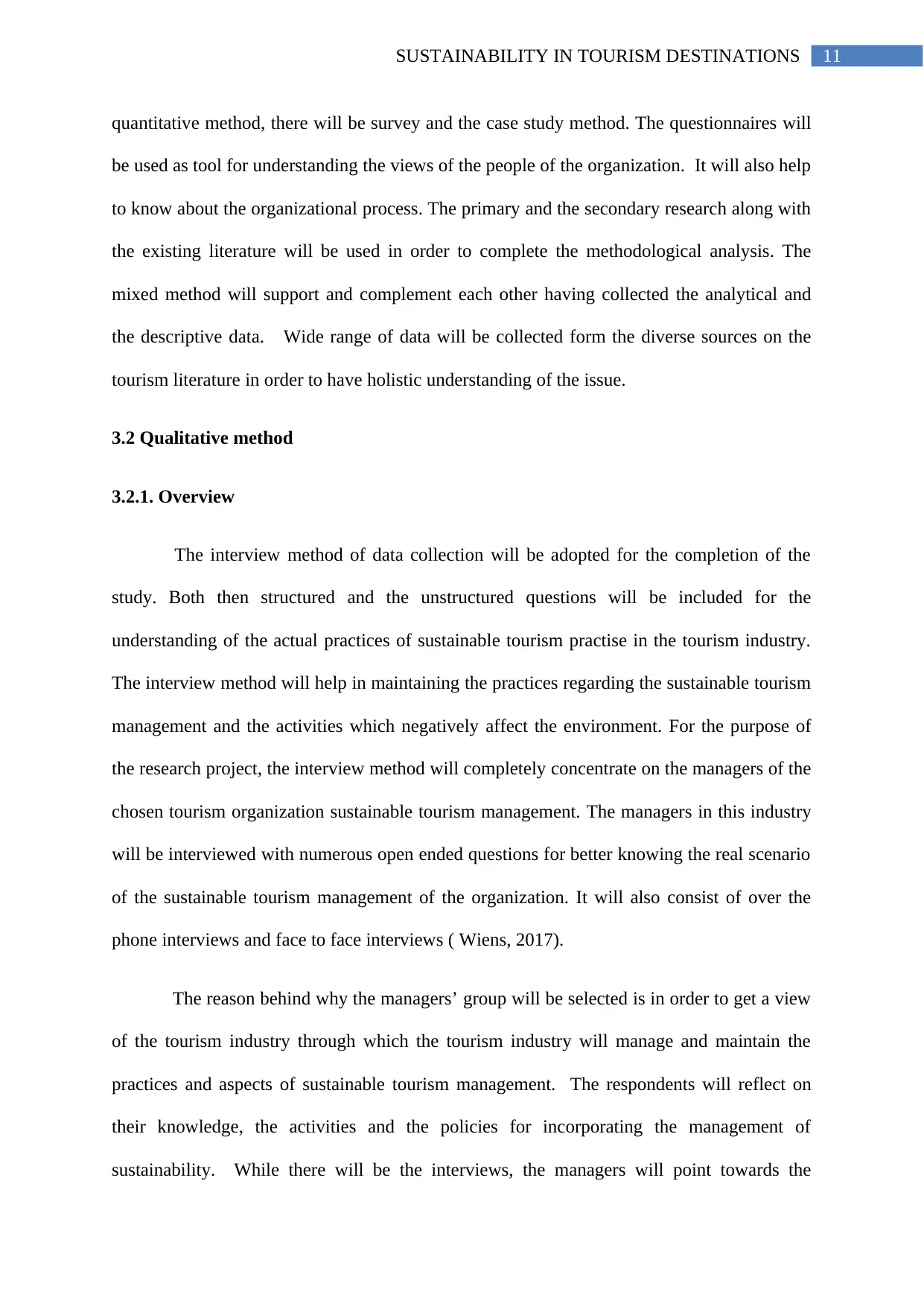
11SUSTAINABILITY IN TOURISM DESTINATIONS
quantitative method, there will be survey and the case study method. The questionnaires will
be used as tool for understanding the views of the people of the organization. It will also help
to know about the organizational process. The primary and the secondary research along with
the existing literature will be used in order to complete the methodological analysis. The
mixed method will support and complement each other having collected the analytical and
the descriptive data. Wide range of data will be collected form the diverse sources on the
tourism literature in order to have holistic understanding of the issue.
3.2 Qualitative method
3.2.1. Overview
The interview method of data collection will be adopted for the completion of the
study. Both then structured and the unstructured questions will be included for the
understanding of the actual practices of sustainable tourism practise in the tourism industry.
The interview method will help in maintaining the practices regarding the sustainable tourism
management and the activities which negatively affect the environment. For the purpose of
the research project, the interview method will completely concentrate on the managers of the
chosen tourism organization sustainable tourism management. The managers in this industry
will be interviewed with numerous open ended questions for better knowing the real scenario
of the sustainable tourism management of the organization. It will also consist of over the
phone interviews and face to face interviews ( Wiens, 2017).
The reason behind why the managers’ group will be selected is in order to get a view
of the tourism industry through which the tourism industry will manage and maintain the
practices and aspects of sustainable tourism management. The respondents will reflect on
their knowledge, the activities and the policies for incorporating the management of
sustainability. While there will be the interviews, the managers will point towards the
quantitative method, there will be survey and the case study method. The questionnaires will
be used as tool for understanding the views of the people of the organization. It will also help
to know about the organizational process. The primary and the secondary research along with
the existing literature will be used in order to complete the methodological analysis. The
mixed method will support and complement each other having collected the analytical and
the descriptive data. Wide range of data will be collected form the diverse sources on the
tourism literature in order to have holistic understanding of the issue.
3.2 Qualitative method
3.2.1. Overview
The interview method of data collection will be adopted for the completion of the
study. Both then structured and the unstructured questions will be included for the
understanding of the actual practices of sustainable tourism practise in the tourism industry.
The interview method will help in maintaining the practices regarding the sustainable tourism
management and the activities which negatively affect the environment. For the purpose of
the research project, the interview method will completely concentrate on the managers of the
chosen tourism organization sustainable tourism management. The managers in this industry
will be interviewed with numerous open ended questions for better knowing the real scenario
of the sustainable tourism management of the organization. It will also consist of over the
phone interviews and face to face interviews ( Wiens, 2017).
The reason behind why the managers’ group will be selected is in order to get a view
of the tourism industry through which the tourism industry will manage and maintain the
practices and aspects of sustainable tourism management. The respondents will reflect on
their knowledge, the activities and the policies for incorporating the management of
sustainability. While there will be the interviews, the managers will point towards the
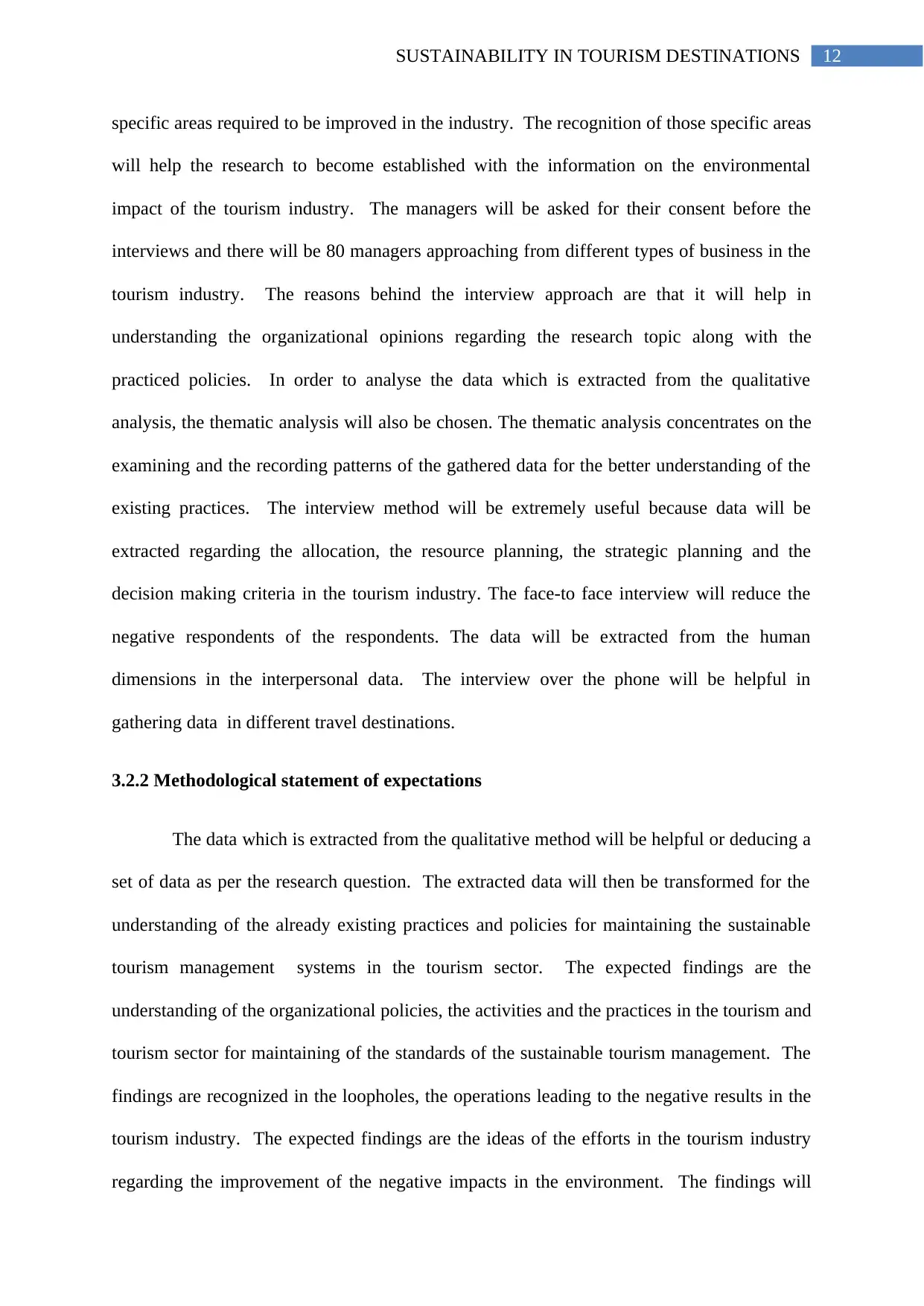
12SUSTAINABILITY IN TOURISM DESTINATIONS
specific areas required to be improved in the industry. The recognition of those specific areas
will help the research to become established with the information on the environmental
impact of the tourism industry. The managers will be asked for their consent before the
interviews and there will be 80 managers approaching from different types of business in the
tourism industry. The reasons behind the interview approach are that it will help in
understanding the organizational opinions regarding the research topic along with the
practiced policies. In order to analyse the data which is extracted from the qualitative
analysis, the thematic analysis will also be chosen. The thematic analysis concentrates on the
examining and the recording patterns of the gathered data for the better understanding of the
existing practices. The interview method will be extremely useful because data will be
extracted regarding the allocation, the resource planning, the strategic planning and the
decision making criteria in the tourism industry. The face-to face interview will reduce the
negative respondents of the respondents. The data will be extracted from the human
dimensions in the interpersonal data. The interview over the phone will be helpful in
gathering data in different travel destinations.
3.2.2 Methodological statement of expectations
The data which is extracted from the qualitative method will be helpful or deducing a
set of data as per the research question. The extracted data will then be transformed for the
understanding of the already existing practices and policies for maintaining the sustainable
tourism management systems in the tourism sector. The expected findings are the
understanding of the organizational policies, the activities and the practices in the tourism and
tourism sector for maintaining of the standards of the sustainable tourism management. The
findings are recognized in the loopholes, the operations leading to the negative results in the
tourism industry. The expected findings are the ideas of the efforts in the tourism industry
regarding the improvement of the negative impacts in the environment. The findings will
specific areas required to be improved in the industry. The recognition of those specific areas
will help the research to become established with the information on the environmental
impact of the tourism industry. The managers will be asked for their consent before the
interviews and there will be 80 managers approaching from different types of business in the
tourism industry. The reasons behind the interview approach are that it will help in
understanding the organizational opinions regarding the research topic along with the
practiced policies. In order to analyse the data which is extracted from the qualitative
analysis, the thematic analysis will also be chosen. The thematic analysis concentrates on the
examining and the recording patterns of the gathered data for the better understanding of the
existing practices. The interview method will be extremely useful because data will be
extracted regarding the allocation, the resource planning, the strategic planning and the
decision making criteria in the tourism industry. The face-to face interview will reduce the
negative respondents of the respondents. The data will be extracted from the human
dimensions in the interpersonal data. The interview over the phone will be helpful in
gathering data in different travel destinations.
3.2.2 Methodological statement of expectations
The data which is extracted from the qualitative method will be helpful or deducing a
set of data as per the research question. The extracted data will then be transformed for the
understanding of the already existing practices and policies for maintaining the sustainable
tourism management systems in the tourism sector. The expected findings are the
understanding of the organizational policies, the activities and the practices in the tourism and
tourism sector for maintaining of the standards of the sustainable tourism management. The
findings are recognized in the loopholes, the operations leading to the negative results in the
tourism industry. The expected findings are the ideas of the efforts in the tourism industry
regarding the improvement of the negative impacts in the environment. The findings will
⊘ This is a preview!⊘
Do you want full access?
Subscribe today to unlock all pages.

Trusted by 1+ million students worldwide
1 out of 21
Related Documents
Your All-in-One AI-Powered Toolkit for Academic Success.
+13062052269
info@desklib.com
Available 24*7 on WhatsApp / Email
![[object Object]](/_next/static/media/star-bottom.7253800d.svg)
Unlock your academic potential
Copyright © 2020–2025 A2Z Services. All Rights Reserved. Developed and managed by ZUCOL.





